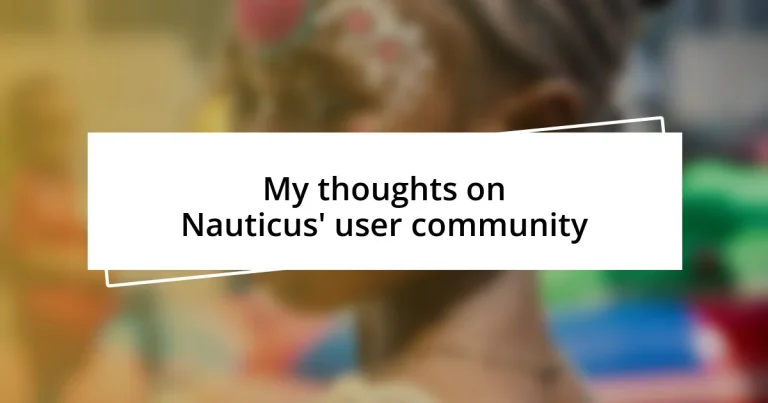Key takeaways:
- The Nauticus community fosters strong connections, shared learning, and support among users, enhancing the overall platform experience.
- User feedback is crucial for the platform’s evolution, allowing for continual improvements based on community suggestions and concerns.
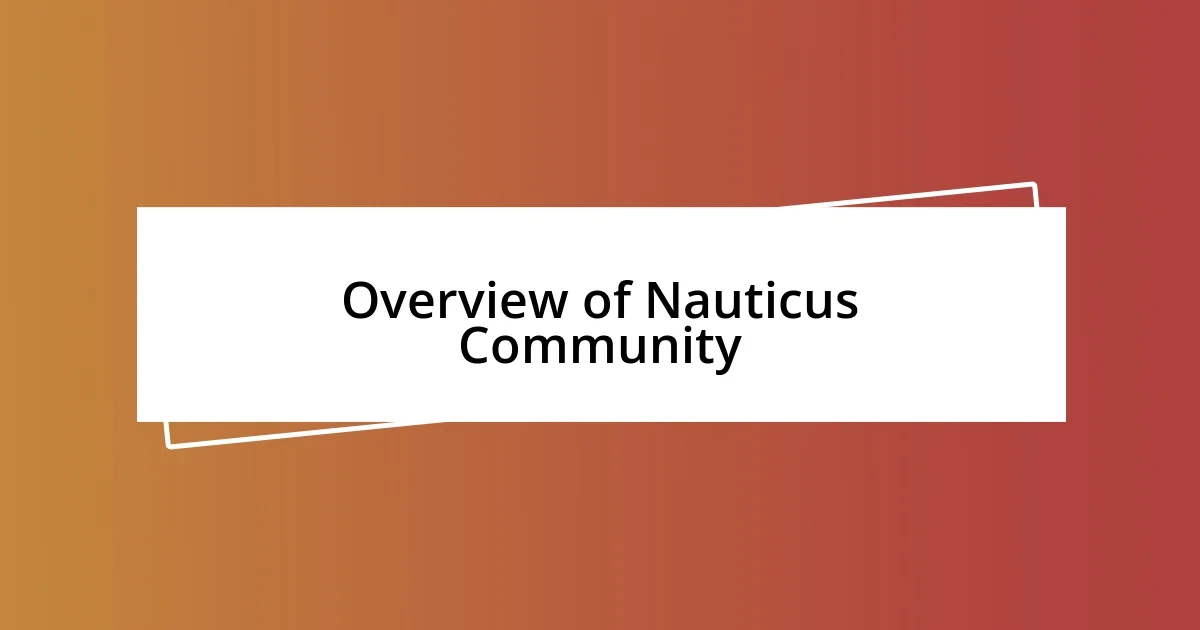
Overview of Nauticus Community
The Nauticus community is a vibrant collective of individuals united by their passion for the platform and its innovative potential. I remember my first engagement with fellow users; the excitement was palpable as we exchanged ideas and experiences, each contribution feeling like a spark of inspiration. Isn’t it fascinating how a shared interest can create such instant connections among people from diverse backgrounds?
Within this community, users actively support one another, sharing tips, resources, and insights that enhance our collective knowledge. I find it heartwarming to witness someone helping a newcomer navigate through the complexities of the platform. The enthusiasm is contagious—what’s not to love about a group that thrives on collaboration and mutual growth?
As I explore the various forums and discussions, I often reflect on how this kind of environment fosters creativity and innovation. Have you ever felt the thrill of being part of something larger than yourself? It’s in these interactions that I see real potential for personal and professional development, making the Nauticus community more than just a user group; it’s a nurturing ecosystem.
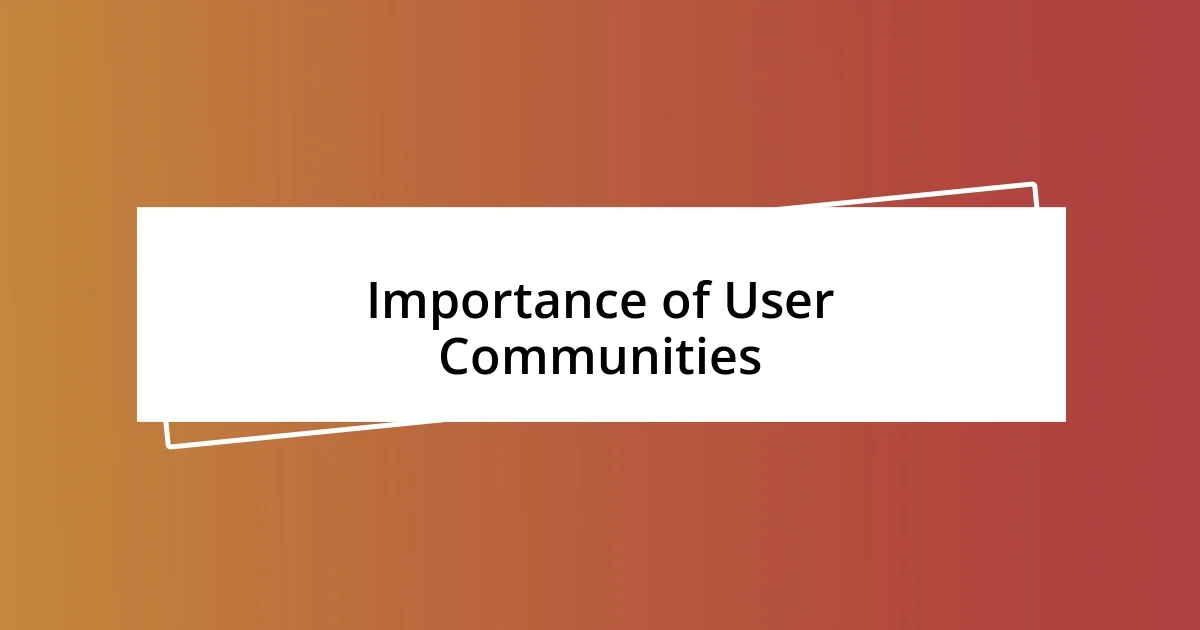
Importance of User Communities
User communities play a pivotal role in shaping individual experiences and outcomes within any platform. From my perspective, the Nauticus user community exemplifies this perfectly; the connections formed here go beyond simple interactions. I can recall a moment when a fellow user shared a breakthrough they’d achieved, and the wave of support that followed was nothing short of inspiring. This level of engagement not only bolsters confidence but also motivates others to push their boundaries and explore new possibilities.
Moreover, having a solid user community cultivates a culture of shared learning. When I first joined Nauticus, I found myself overwhelmed by all the features. But it was through community forums where I gleaned insights from other users who had faced similar challenges. This camaraderie creates a rich tapestry of experiences and solutions that I believe enhances the overall effectiveness of the platform for everyone involved. Without this supportive network, navigating the complexities can feel quite daunting.
Lastly, a strong user community serves as a feedback loop for the platform itself. It’s fascinating how the collective voice of the users can drive enhancements and innovations. I’ve personally witnessed updates being implemented based on user suggestions, making me feel valued as part of the Nauticus ecosystem. This fluid exchange between users and developers not only fosters loyalty but also guarantees that the platform evolves in a way that genuinely reflects its users’ needs.
| Importance of User Communities | Examples from Nauticus |
|---|---|
| Building connections | Supportive interactions and friendships among diverse users. |
| Enabling shared learning | Users sharing tips and troubleshooting strategies to aid each other. |
| Providing feedback | Community suggestions influencing platform features and updates. |
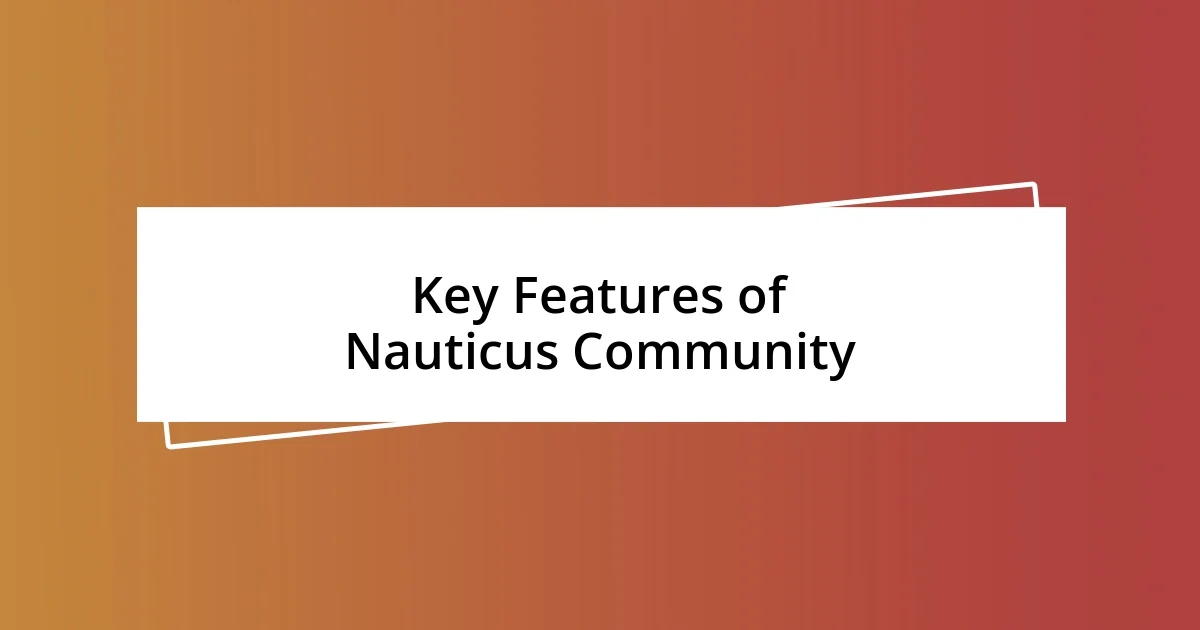
Key Features of Nauticus Community
The Nauticus community thrives on a range of key features that enhance user experience. One standout aspect is the accessibility of diverse learning resources. I cherish moments when I stumbled upon detailed tutorials and FAQs that were crafted by fellow users, which often feel more relatable than official documentation. It’s rewarding to see how these contributions break down complex topics, making them approachable for everyone, including those just starting.
- Rich Resource Pool: Access to tutorials, guides, and FAQs created by users.
- Engaging Events: The community hosts workshops and webinars, fostering learning.
- Discussion Forums: Spaces where users can ask questions and share experiences freely.
Additionally, it’s amazing how a sense of belonging permeates every interaction. I remember participating in a live Q&A session, where members shared both struggles and victories. The openness of everyone made me feel like I was welcomed into a big family. This kind of emotional support transforms the learning curve into a shared journey, where everyone celebrates each other’s milestones, no matter how small.
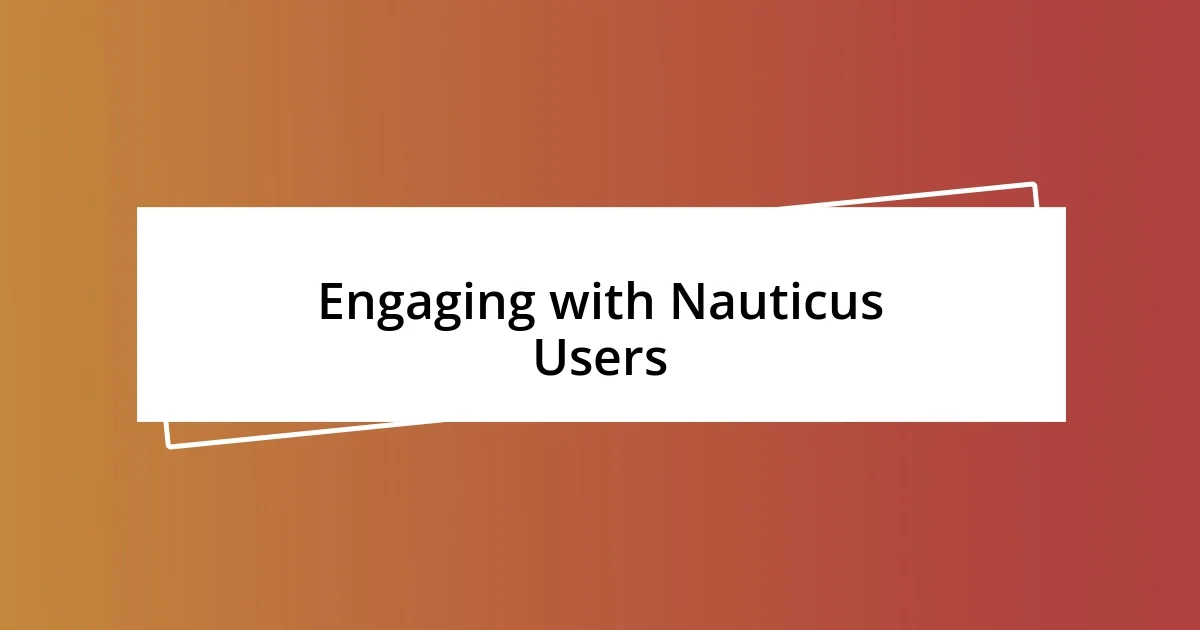
Engaging with Nauticus Users
Engaging with the Nauticus user community is like stepping into a vibrant marketplace of ideas and experiences. I still vividly remember when I shared a question about a specific feature, and within minutes, multiple users began to chime in with their insights. This spontaneous interaction not only answered my query but also deepened my sense of connection with the community. Doesn’t it feel great when your questions spark discussions that extend far beyond what you initially asked?
Moreover, I’ve found that participating in community events, such as webinars or virtual meet-ups, significantly enriches my engagement. I once attended a workshop that opened my eyes to advanced techniques in using Nauticus. The enthusiasm from the presenters and fellow participants was infectious, creating an atmosphere of collective learning. It’s hard not to feel inspired when you’re surrounded by others eager to share their knowledge and skills. Have you ever participated in an event like that? If so, you likely felt that powerful blend of excitement and camaraderie.
Lastly, I appreciate how transparency in discussions promotes a culture of trust among users. Every time I see feedback being taken seriously—like when users voiced concerns over a bug, and it was promptly addressed—I feel a sense of belonging. It’s more than just a platform; it’s a community where our collective voices shape the experience. Doesn’t knowing your input matters elevate your connection to a platform? For me, this feedback loop not only fosters loyalty but also makes me incredibly proud to be part of the Nauticus family.
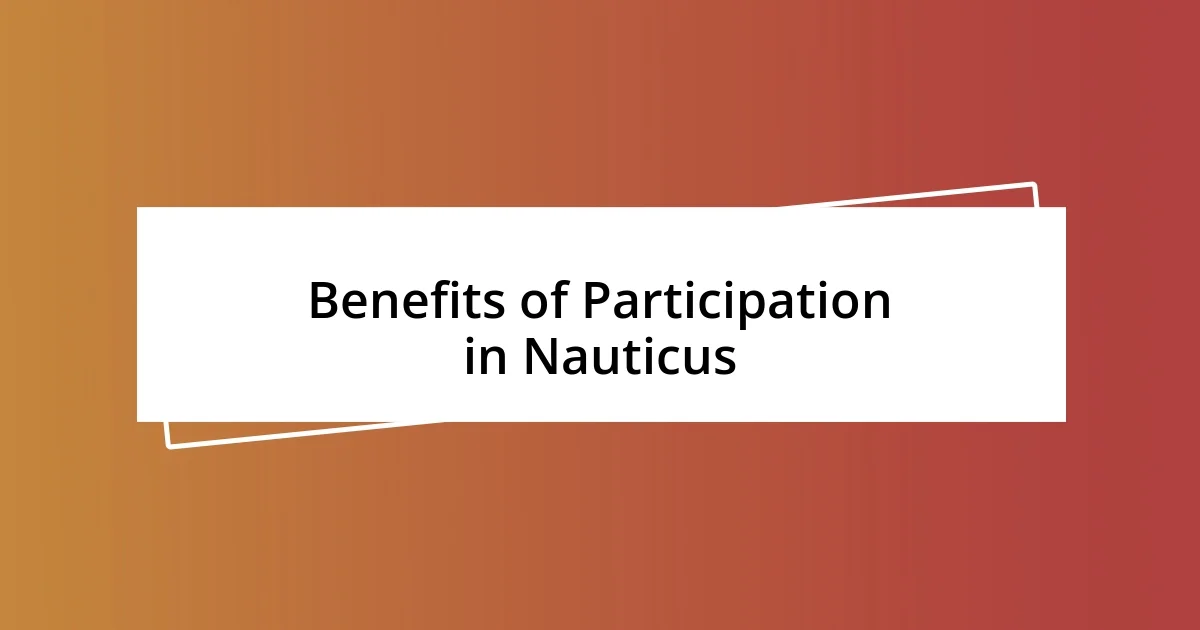
Benefits of Participation in Nauticus
Participating in Nauticus has brought a wealth of benefits that I didn’t initially anticipate. One significant advantage is the ability to tap into a rich resource pool created by users. I remember when I was grappling with a tricky problem, and a user-generated guide provided the exact steps I needed. It felt like finding a compass in a maze! This kind of shared knowledge fosters an environment where learning becomes a communal effort, which is invaluable.
Another perk that stands out to me is the engaging events that Nauticus organizes. During one memorable webinar, I had the chance to engage directly with experts and my peers in real time. The excitement in the virtual room was palpable as we exchanged tips and tackled challenges together. Have you ever been in a space where the energy is so motivating that you leave buzzing with inspiration? I absolutely did, and I left the session with not just new skills, but a renewed sense of purpose in using Nauticus.
Finally, I’ve often found that the discussions within the community transcend mere troubleshooting; they cultivate a supportive atmosphere that belongs uniquely to Nauticus. When I shared my first project’s success, the flood of congratulatory messages and encouragement from fellow users made me feel like a star. Isn’t it amazing how a few kind words can fuel your ambition? That emotional uplift is a significant benefit that keeps me engaged and enthusiastic about being part of this vibrant community.
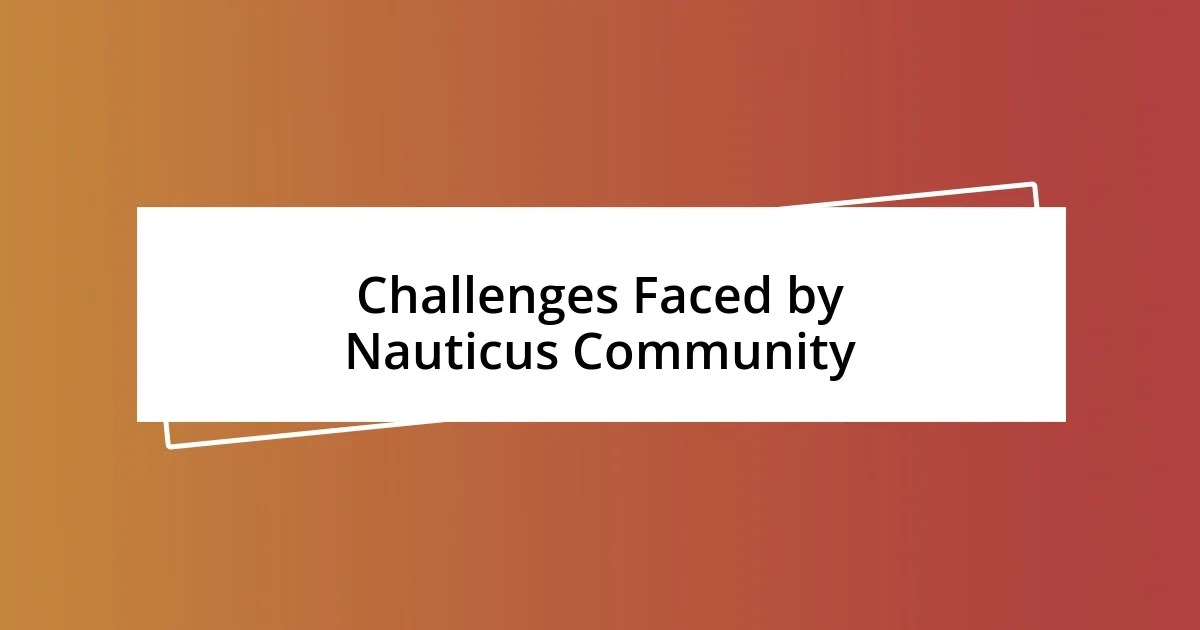
Challenges Faced by Nauticus Community
The Nauticus community faces several hurdles that can sometimes hinder its vibrant atmosphere. One challenge I’ve noticed is the varying levels of expertise among users. It can be daunting for newcomers to engage when they feel overwhelmed by technical jargon or advanced concepts that more seasoned members discuss. I remember feeling lost during my early days, scrolling through threads that seemed meant for experts only. It made me wonder: how can we bridge this gap and ensure that everyone feels included regardless of their experience level?
Another issue that often arises is the miscommunication or lack of clarity during discussions. I recall a time when I attempted to clarify a point in a thread, but my message got tangled in misunderstandings. It led to confusion and unintentionally derailed the conversation. Isn’t it frustrating when that happens? This experience taught me the importance of clear communication to keep the dialogue constructive and supportive. It’s crucial for the community to foster an environment where questions are welcomed and misunderstandings can be addressed promptly.
Lastly, there’s the challenge of addressing user feedback effectively. While the transparency I appreciate is vital, I’ve witnessed times when user concerns didn’t receive timely responses, which can dampen morale. I’ve felt that sting firsthand when I was left waiting for an update on a bug I reported. That feeling of being unheard can create a sense of disconnect. Perhaps we could benefit from more structured ways to follow up on feedback to help maintain trust and encourage active participation within the community.
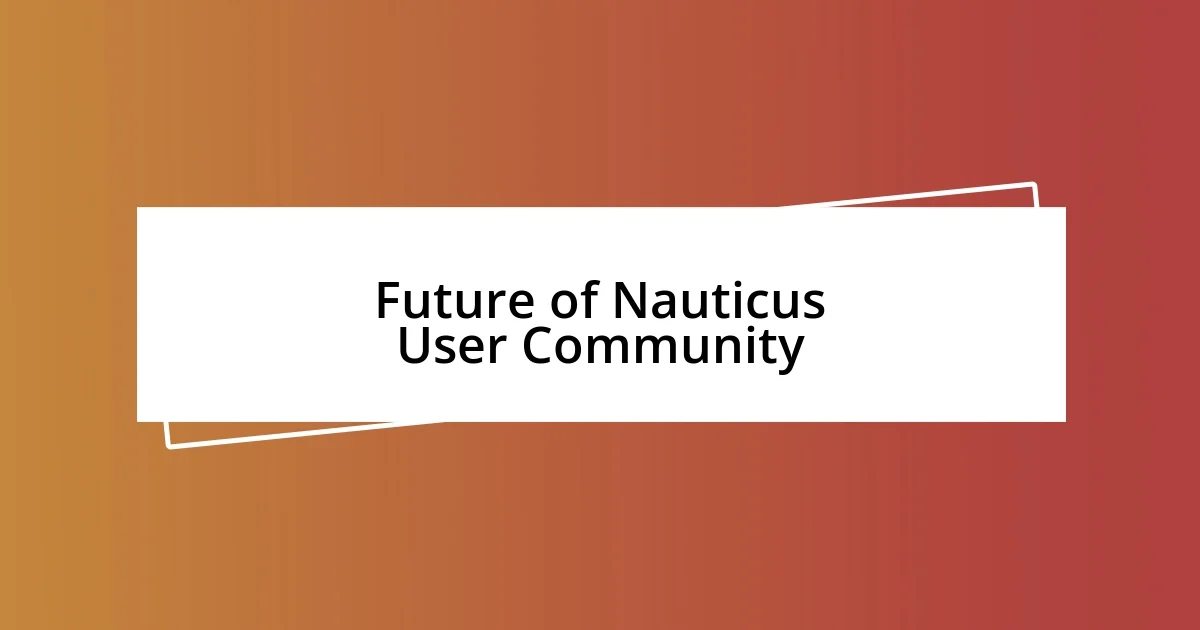
Future of Nauticus User Community
Looking ahead, I see tremendous potential for the Nauticus user community to evolve and adapt. Imagine a space where even the newest members feel empowered to share their experiences without fear of being judged. I believe fostering mentorship programs could bridge gaps in knowledge, creating a culture that supports growth and shared success. Wouldn’t it be incredible to witness seasoned users guiding newcomers, much like a friendly lighthouse directing ships to shore?
As technology continues to advance, I envision Nauticus embracing new tools to enhance communication. I remember my excitement when I first explored interactive platforms that allowed real-time discussions and brainstorming sessions. The energy from collaborative tools can transform a simple forum into a dynamic think tank. Can you picture the synergy that would arise from live Q&A sessions where users contribute insights in the moment?
Moreover, I feel there’s a significant opportunity to nurture specialized subgroups within the community. We’ve all gravitated towards certain areas of interest; whether it’s advanced analytics or creative applications, it would be fantastic to create dedicated spaces for these explorations. Again, think back to the buzz in a focused session—every participant eager to share their unique insights. By cultivating these smaller clusters, we could enhance relationships and deepen engagement across the broader Nauticus landscape.












